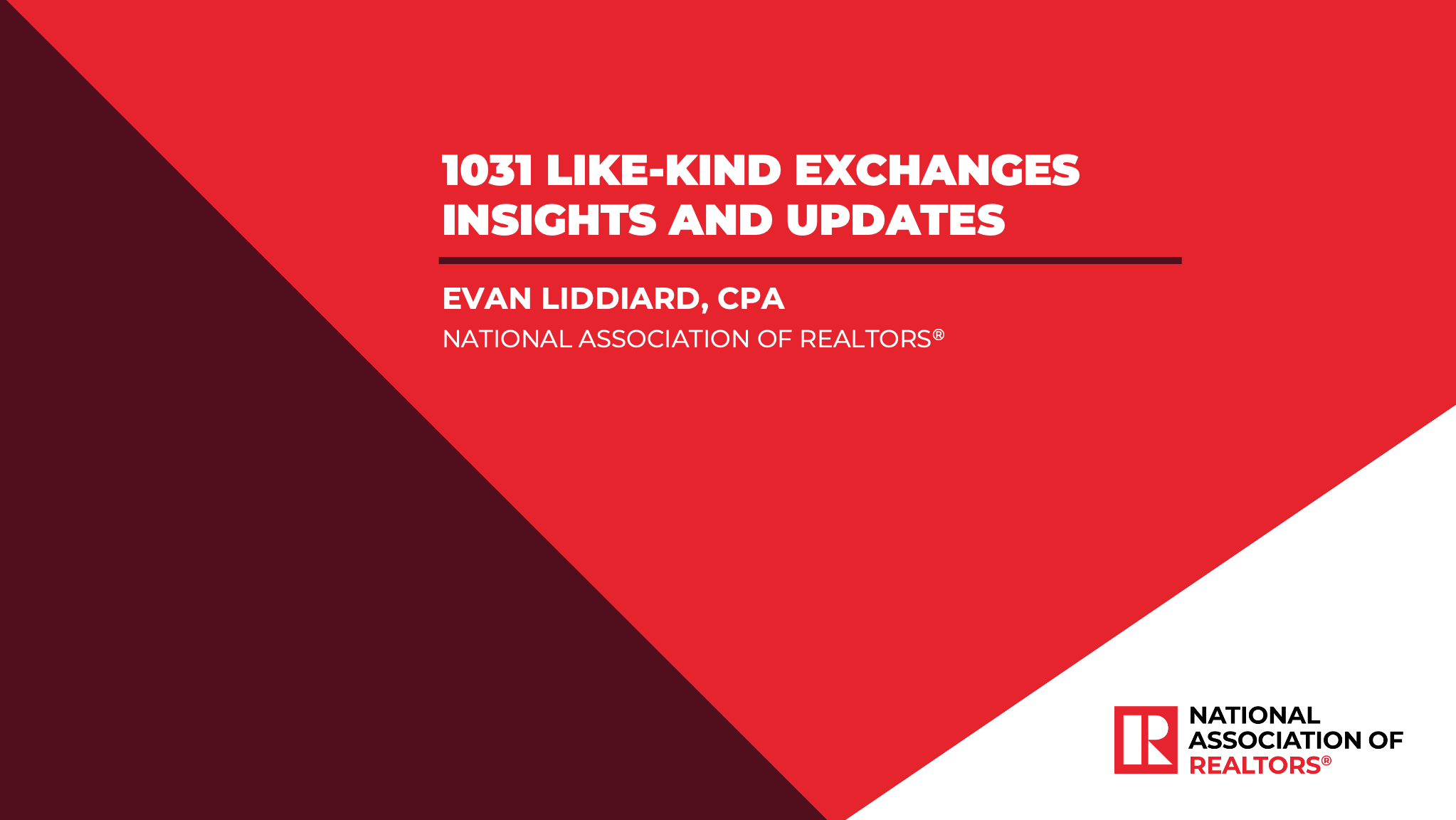Advocacy
References
NAR Library & Archives has already done the research for you. References (formerly Field Guides) offer links to articles, eBooks, websites, statistics, and more to provide a comprehensive overview of perspectives. EBSCO articles (E) are available only to NAR members and require the member's nar.realtor login.
1031 Exchanges: The Basics
What is a 1031 Exchange? A Guide to the Basics, Rules & What to Know (Nerd Wallet, Aug. 2, 2023)
“In effect, you can change the form of your investment without (as the IRS sees it) cashing out or recognizing a capital gain. That allows your investment to continue to grow tax-deferred. There’s no limit on how frequently you can do a 1031 exchange. You can roll over the gain from one piece of investment real estate to another and another and another.”
The Process of a 1031 Tax-Deferred Exchange Explained (Bloomberg Tax, May 12, 2022)
“The replacement property must be of equal or greater value than the relinquished property and all cash equity from the sale must be reinvested to have no tax on the sale of the relinquished property. If the exchanger buys a property of lesser value, the difference of the two property values is subject to capital gains tax and unrecaptured depreciation tax.”
What is a 1031 Exchange? Know the Rules (Investopedia, Jul. 19, 2022)1031 Like-Kind exchanges, often used to “trade” one real estate property to defer capital gains taxes, have many rules. With many moving parts, there are special rules for depreciable properties, a 45-day rule, a 180-day rule, a reverse exchange and various other rules for second properties, vacation homes etc.
Rules, Forms, & Guidelines From the IRS
The following links provide instructions and tips for IRS tax forms relating to 1031 Like-Kind Exchanges.
Like-Kind Exchanges – Real Estate Tax Tips (United States Internal Revenue Service, Nov. 2, 2023)
What is IRS Form 8824: Like-Kind Exchange (TurboTax, Oct. 19, 2023)
About Form 8824, Like-Kind Exchanges (United States Internal Revenue Service, Feb. 14, 2023)
1031 Exchanges for REALTORS®
Find Opportunities for 1031 Exchanges in Today’s Market (REALTOR® Magazine, May 24, 2023)
“Reading news reports about the state of the real estate market in the U.S., investors might well decide to wait out the market turmoil, particularly as it relates to pondering financing options. For investors with cash and a long-term outlook, though, this may be an optimal time to use the Sec. 1031 tax-deferred exchange to reposition their portfolio.”
How to Do 1031 Exchanges to Defer Taxes (The Balance, Feb. 27, 2023)
“When a replacement property is selected, the taxpayer has 180 days from the date the relinquished property was transferred to the buyer to close on the new replacement property. But the exchange must be completed by the earlier date if the due date for the investor's tax return for the tax year in which the relinquished property was sold is earlier than the 180-day period end date.”
The 1031 Like-Kind Exchange Is a Key Tool for Investing in Diverse and Inclusive Communities (National Association of REALTORS®, May 6, 2021)
“David Doig, President and CEO of Neighborhood Initiatives developed a national grocery story in the food desert of a Chicago’s Southside Bronzeville neighborhood. The site was formerly the demolished Ida B. Wells Public Housing Complex where it remained a vacant lot for more than 15 years. David’s company developed a Mariano’s grocery store in its place and then a New York investment group purchased the new development through a 1031 like-kind exchange. This outside capital infused a rebirth of jobs, housing, and commerce into the community.”
Like-Kind Exchange Transactions of REALTORS® in 2016-2019 (National Association of REALTORS®, Sep. 4, 2020)
This report, published midway through 2020, details the use of like-kind exchanges among REALTORS® from 2016-2019. It highlights the changes that occurred to the 1031 in with The Tax Cuts and Jobs Act of 2017. According to the report, a “majority of properties that were sold in like-kind exchange were held by small investors and that additional capital was invested in the property acquired nine times out of ten.”
Delaware Statutory Trusts (DSTs)
Understanding the Delaware Statutory Trust Full-Cycle Event (Forbes, Aug. 22, 2023)
“For DST investments, the term “full cycle” refers to the complete life cycle of a DST investment, from when the real estate asset was initially acquired all the way through its ultimate disposition or sale. This life cycle begins with the acquisition of the underlying real estate assets by the DST sponsor company, followed by the offering of beneficial interests within the DST to investors seeking a 1031 exchange strategy.”
3 Reasons Delaware Family Trusts Are Here to Stay (Kiplinger, Oct. 27, 2022)
“One of the most fundamental forces helping protect the 1031 exchange market is demographics. According to expert researcher and data analyst Jonathan Jones of Construction Coverage, Baby Boomers hold more real estate wealth than any other generation in history. Born 1946 through 1964, Baby Boomers have an influence on all things real estate that cannot be overstated.”
Delaware Statutory Trust (The Balance, Dec. 27, 2021)
“DST investors may benefit from a professionally managed, potentially institutional-quality property. The underlying property could be a 500-unit apartment building, a 100,000 square-foot medical office property, or a shopping center leased to investment-grade tenants. Most DST investments are assets that your run-of-the-mill, small- to mid-sized accredited investors could not otherwise afford. However, by pooling money with other investors, they can acquire this type of asset.”
Preferred Structure: As a Form of Fractional Investment, DSTs Have Become Popular as a Replacement for 1031 Exchanges (Wealth Management Real Estate, Apr. 1, 2021) E
Delaware Statuary Trusts have become increasingly popular in recent months. Lending DST sponsor, Capital Square Realty, has reported that the first three months of 2021 saw a huge increase in DST activity, helping them have their “strongest year ever.” At least part of this success can be ascribed to the growing amount of accredited investors – baby boomers. As baby boomers continue to age into retirement, they often are looking for new properties and passive income, the perfect situation for DSTs.
Websites
Guide to 1031 Exchanges: Basics, Resources & Intermediaries (BiggerPockets.com)—Quick overview of how 1031 exchanges work, with links to recommended resources and a list of qualified intermediaries.
Federation of Exchange Accomodators (FEA)—Professional organization for exchange specialists. Includes directory of exchange companies & specialists around the U.S.
eBooks & Other Resources
Our eBooks collection contains a plethora of both audio and electronic books for learning a diversity of foreign languages and cultural etiquette standards. Below you will find a sampling of materials available; to identify additional materials visit our Library Catalog Advanced Search page and search for Subject: International or Subject: Foreign.
The Tax-Free Exchange Loophole: How Real Estate Investors Can Profit from the 1031 Exchange (eBook)
Books, Videos, Research Reports & More
As a member benefit, the following resources and more are available for loan through the NAR Library. Items will be mailed directly to you or made available for pickup at the REALTOR® Building in Chicago.
Building Wealth Through 1031 Exchanges (Exchange Facilitator, LLC, 2006)
1031 Exchanges: How They Work (Professional Exchange Accommodators, LLC, 2005)
The Tax-Free Exchange Loophole (Wiley, 2005)
Have an idea for a real estate topic? Send us your suggestions.
The inclusion of links on this page does not imply endorsement by the National Association of REALTORS®. NAR makes no representations about whether the content of any external sites which may be linked in this page complies with state or federal laws or regulations or with applicable NAR policies. These links are provided for your convenience only and you rely on them at your own risk.



























